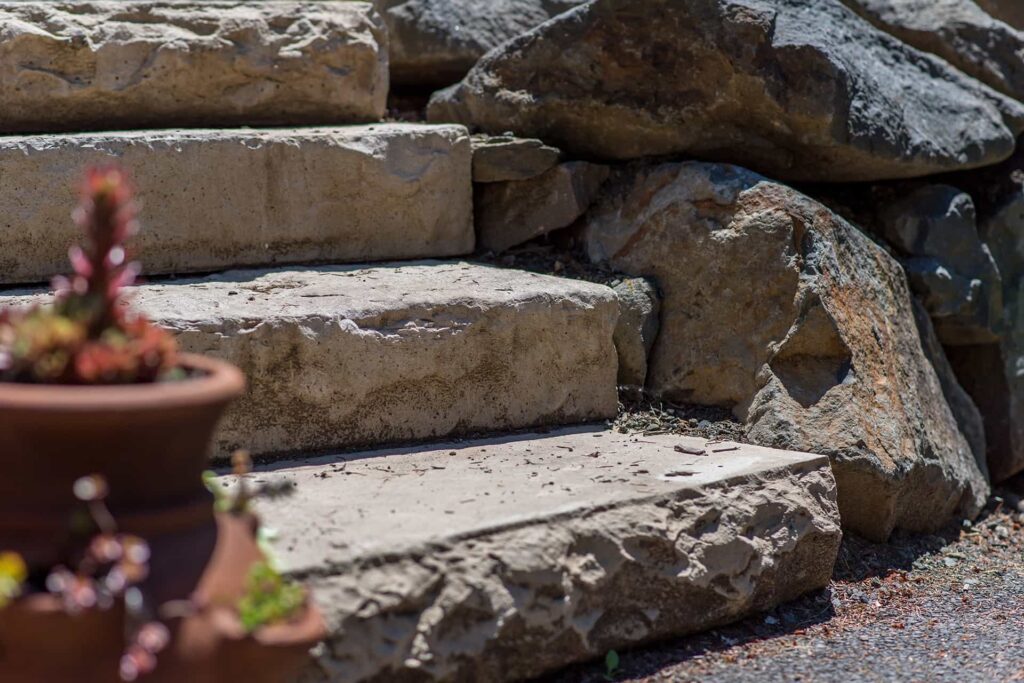FAQ

Frequently Asked Questions
Need more info? We have answers!
Learn how to care for your renovated outdoor area, your options for paver sealing—and anything else you’re wondering about our work.
General
Yes, we guarantee our projects for five years.
Pavers last two to three times longer than concrete! They are more resistant to cracking than concrete—and, unlike concrete, can be easily fixed. If tree roots near your driveway start to push up on your paving, for example, you can easily “spot-repair” by replacing only the damaged pavers. But cracked concrete would have to be replaced entirely. Pavers also last through the freezing and thawing of the winter months, as they move with the ground and won’t crack the way concrete does.
We work with any material the client prefers.
Permeable pavers are designed with a deeper, open graded base and bedding material; they have wider joints to allow 100% of rainwater to drain through. This means permeable pavers can be laid down completely flat. With regular pavers, you still need to slope for drainage runoff—in other words, the pavers will be laid in a gradual slope to guide water to a drain.
Installation
Patios & walkways
Stone Paving, Inc. performs any demolition needed and excavates the site. Then, we install a layer of geotextile fabric as a barrier between the native soil and the gravel base for the pavers. (This prevents the gravel base from migrating into the soil over time.)
We then install a minimum of 4 inches of ¾-minus gravel, and compact it multiple times. Once the base reaches proper compaction, we install 1 inch of bedding sand, and put pavers on top. We cut the pavers as needed with a masonry saw for smooth edges, using a dustless vacuum system to prevent excessive dust and mess. Finally, we compact the pavers with a plate compactor and sweep special sand (see below) into the paver joints.
Driveways
The process for driveways is similar to the one for patios and walkways, but:
1) The excavation is deeper, and we install an 8-inch gravel base.
2) We compact the gravel with a 1,000-pound plate compactor to ensure the base gravel is solidly packed to support vehicular traffic.
We provide paver sealing services for longer-lasting quality on all projects.
Pressure washing is very effective.
We recommend waiting about a day.
The amount of gravel depends on the project. We typically use:
8 – 10 inches for a driveway.
3 – 4 inches for a patio or pathway.
Maintenance
Pro: We offer paver sealing services to prevent many common stains—oil left by vehicles or grease from grills, for example. Sealing also helps maintain the color of your paving, which weather and UV rays can fade over time. And, our sealers have anti-fungal properties and provide paver joint stabilization.
Cons: Depending on what type of finish you apply, you will have to re-seal every few years.
For a “matte” finish, the sealer soaks into the paver and protects it. You only have to reapply this type of sealer every five years.
For either a “wet look” finish or a shiny, color-enhancing finish, the sealer creates a layer on top of the pavers. These two types of sealcoating must be reapplied every two to three years—more frequently than the matte-finish sealer.
Moss can be an issue with any paving, especially if it gets into paver joints. We recommend laying polymeric sand to guard against moss.
You can use sweeping sand, which allows a small amount of water to drain through paver joints. Or, you can apply polymeric sand (our recommendation), which will harden between the joints, helping with joint erosion and weed control. Polymeric sand will not allow as much water to drain through the paver joints, however.
Polymeric sand is used to fill joints between pavers. It’s a fine-grained sand with silica, which forms a binding agent when it gets wet. Once it binds, it stabilizes the pavers, and heavy rain won’t wash it out. The sand prevents weeds growing in cracks, and because it stands up to pressure washing, you won’t have to resand after you clean.
Yes, we can clean and seal your existing hardscapes—even if Stone Paving, Inc. did not install the project.
There are specialized cleaners that work wonders: rust remover for fertilizer stains, and oil cleaner for oil stains will do the job. Follow instructions on the cleaner bottle.
For a home remedy:
Liquid dish soap or laundry detergent, both designed to tackle grease, will work on oil stains. Apply the soap directly to the stain and let it soak for 20 minutes. Scrub clean with a nylon-bristle brush and rinse with warm water. For fertilizer stains, scrub lightly with a 50:50 water/vinegar solution, rinse and repeat.

